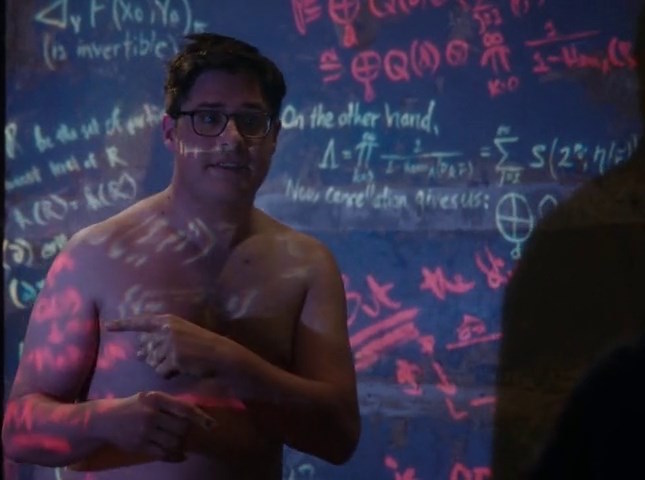
a list compiled by Alex Kasman (College of Charleston)

a list compiled by Alex Kasman (College of Charleston)
| Home | All | New | Browse | Search | About |
| ... |
|
| ... |
| In this episode from the second season of Elementary featuring a modern version of Sherlock Holmes with a female Watson, the duo discover equations in invisible ink on the walls in a murdered mathematician's apartment. With the help of an old acquaintance (a mathematician who, to Watson's dismay, must remove his clothing to think about math), they soon discover that two researchers writing on those walls were close to solving one of the most famous and important open questions in mathematics today: P vs. NP.
 
P vs. NP is real and has to do with how long it would take to solve certain mathematical problems as compared with merely checking a given proposed solution. In general, it is easier to check a potential answer than to find a new answer from scratch. If we want to get even more specific, we have to introduce a number n which shows up in the statement of the question (it generally measures a size or complexity, like the number of digits in the "answer" or the size of the set being considered). We say a problem is in "P" if the amount of time it would take to check a possible answer for validity is less than some polynomial in n. Similarly, we say that a question is in "NP" if we actually can always find an answer to the question in an amount of time bounded by a polynomial in n. Theoretically, it seems possible for a question to be in P but not in NP, because solving it is so much harder than checking an answer. But is it true? Are they actually equal? That is the question of P vs. NP. Since this topic of research is both of great interest and certainly financially lucrative (there is a $1 million prize offered for its solution, aside from any profits that could be made from practical applications of ideas in the proof), it is not entirely unreasonable to think that it could be the basis for a murder. In the show, they go farther and assume that a solution to P vs. NP would necessarily allow one to read encrypted messages and login to other people's e-mail accounts. This is not a completely ridiculous idea, but it is also not necessarily correct. (In fact, if one proved that P is not equal to NP, that would merely confirm the suspicion that there isn't an easy way to do those things. Moreover, even if one proved that P=NP, one would be able to conclude that there is some quick way to do those things, but you might merely know that such a method exists without actually knowing what it is.) I am grateful to College of Charleston student Stephanie Bradley for bringing this episode to my attention. (Stephanie mentions that math shows up in another episode as well, in that decimal expansions of integer multiples of pi are used by hackers to represent supposedly random numbers.)
It turns out that the murderer is a female mathematician who killed the two reclusive mathematicians who were close to proving the P=NP because she had already done it. Rather than publishing her work, At the end of the episode, Sherlock makes some remarks about the NSA and the New York District Attorney which are supposed to leave us thinking that she will be keeping her knowledge a secret and that therefore nothing will change, but that doesn't make much sense to me. Knowing that one person has the ability to read any encrypted message, knowing that two other people were close to achieving the same, that would change things even if we know that one of those people is in prison and the other two are dead. We would know that the knowledge is out there, and could easily be found by someone else as well. If I lived in that world, I would not be as calm about it as Sherlock seems to be. (I would not be keeping my money in a bank account that could be accessed by a password or typing my credit card number into "secure" Websites, for example.) |
| More information about this work can be found at www.imdb.com. |
| (Note: This is just one work of mathematical fiction from the list. To see the entire list or to see more works of mathematical fiction, return to the Homepage.) |
| |||||||||||||||||||||||||
| Home | All | New | Browse | Search | About |
Exciting News: The 1,600th entry was recently added to this database of mathematical fiction! Also, for those of you interested in non-fictional math books
let me (shamelessly) plug the recent release of the second edition of my soliton theory textbook.
(Maintained by Alex Kasman,
College of Charleston)